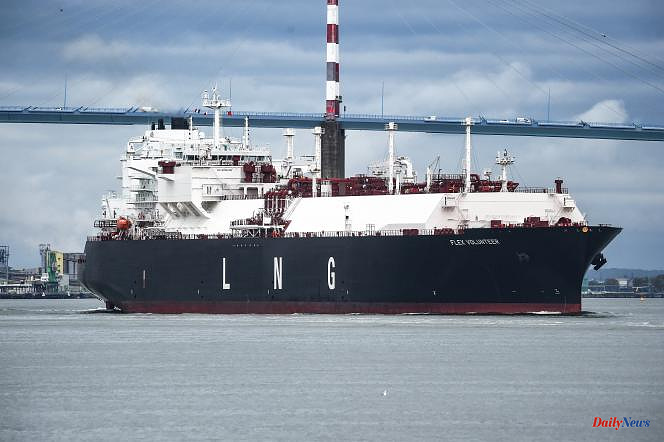As part of the mobilization against the pension reform, three of the four LNG terminals which import liquefied natural gas (LNG) into France have been shut down for "seven days", it was announced on Monday March 6. the CGT section of the terminal operator Elengy. The shutdown of these three terminals located in Fos-sur-Mer (Bouches-du-Rhône) for two of them, and in Saint-Nazaire (Loire-Atlantique) for the third, blocks the gas supply to the network GRT Gaz distribution system, unloading LNG carriers and filling LNG tanks.
The sector thus responds to the inter-union's call to put "France on hold" on March 7, the objective of the great day of mobilization against the pension reform. Truckers also deployed filter barriers on Monday morning, adding to the expected disruptions in transport. On the eve of the movement, we take stock of the disruptions to come.
SNCF and RATP warned that traffic would be badly affected on Tuesday. Only one train in five will run for the TGV Inoui and Ouigo, the same for the TER, and two trains out of three on average on the international Thalys and Eurostar connections. Traffic will be almost at a standstill on the Intercités and many disruptions are to be expected on the Transilien, with between one train in three and one in ten depending on the line.
In Paris, metro traffic will be restricted on most lines, mainly at peak times, except for lines 1, 14 and 4. The RERs will have between one train in two and one train in three on the RATP side, and between one in three and one in five on the SNCF side.
In the air, the Directorate General of Civil Aviation (DGAC) has asked companies to reduce their flight schedules on Tuesdays and Wednesdays, by 20% at Paris - Charles-de-Gaulle and by 30% at Paris-Orly , Beauvais, Bordeaux, Lille, Lyon, Nantes, Marseille, Montpellier, Nice and Toulouse. Air France plans to operate nearly eight out of ten flights, including all of its long-haul flights, without excluding "last minute delays and cancellations".
The garbage collectors, who depend in particular on the transport branch, are also called to strike renewable Tuesday, by the CGT.
In energy, in addition to the announcement of the LNG tankers, the movement started Friday afternoon at the call of the CGT, due to the vote on Saturday evening by the Senate of article 1 of the text on the abolition of special regimes pensions, including that of energy companies. On Sunday, production cuts reached more than 5,000 megawatts at nuclear and thermal power plants, the equivalent of five nuclear reactors. On Monday, these declines still affected many power stations.
On Tuesday, the general assemblies could locally decide on a "recovery of the network" without causing a loss of power, but by removing from the hands of the RTE network manager the possibility of controlling the machines remotely, informed Agence France -Press (AFP) the CGT-Energie, which promises "a black week". "The goal is not necessarily to reach users, but to show that we are present everywhere, that the system is in difficulty and that we are waiting for a response from the government," the union said.
In the refineries, the CGT has also called for a renewable strike with the aim of "blocking the entire economy", in terms of production, distribution and importation of fuel. Initially, the strikers intend to block shipments from refineries to depots. If the movement were to last, it could lead to the shutdown of refineries.
The entire oil and chemical sector is called upon to strike, including in the pharmaceutical sector, and among refuellers, responsible for supplying aircraft with fuel. New in the industry: the call for a strike in the whole of the metallurgy and in particular among the giants of the aeronautics, automotive and steel sectors. The branch union hopes to see the movement renewed.
The first primary union, SNUIpp-FSU, predicts that more than 60% of primary school teachers will be on strike on Tuesday, in nursery and elementary schools. Conversely, no figures expected for colleges and high schools, secondary school teachers not being required to declare themselves forty-eight hours before.
The seven main teachers' unions called for the "total closure of schools, colleges, high schools and services" on March 7. Sporadic blockages by high school students are also expected. Same in the faculties. Student and high school organizations have called for "hardening the movement" against the reform with a day of youth mobilization on March 9.












